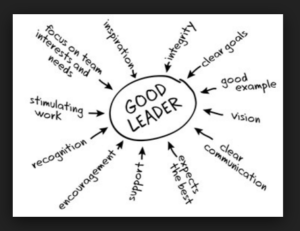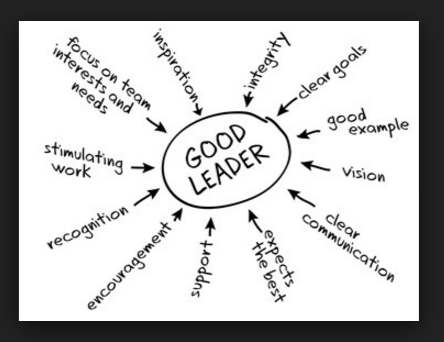Leadership is a struggle by flawed human beings to make some important human values real and effective in the world as it is. Interesting thought from Steven Snyder. Do you consider yourself a leader that promotes loyalty in your team? How important is this leadership characteristic in your mind? I believe that it is more important than ever as employee loyalty is at an all-time low. I have held leadership positions in the military and business for over 40 years. In my mind, there are few, if any, more important successful habits to achieve.

Before we continue, let me ask you a question.
What is your best leadership habit? We would love to hear what it was. Would you do us a favor and post it in the comments section below? Be the one who starts a conversation.
With the advent of the Internet, the number of marketing options available to both budding and experienced entrepreneurs has become staggering.
Here are some of the more important ways to strengthen your leadership habits:
Leaders need to be authentic.Successful habits … be authentic
Nobody likes to work for a phony. In past decades, it was more common for employees to tolerate insincere and ineffective leaders.
These days, younger generations are generally less willing to suffer under bosses they have little respect for.
That’s putting a greater premium on authenticity. Authentic leaders can be counted on to say what they mean and do what they say. They’re the same person to their staff, their own superiors, their customers, and their partners.
Authentic leaders can be counted on to say what they mean and do what they say.
One of my favorite leadership experts is Tanveer Naseer. He is the Principal and Founder of Tanveer Naseer Leadership, a leadership coaching firm that works with executives and managers to help them develop practical leadership and team-building competencies.
I recommend you keep up with his blog, he has lots of knowledge to share in the form of stories and great examples.
Tanveer points out that authenticity refers to being honest in all things–not just what you say and do but who you are. When you’re authentic, your words and actions align with who you claim to be.
Your followers shouldn’t be compelled to spend time trying to figure out if you have ulterior motives. Any time they spend doing so erodes their confidence in you and in their ability to execute.
Leaders who are authentic are transparent and forthcoming. They aren’t perfect, but they earn people’s respect by walking their talk.
Leadership habits … serve your team
Leaders who inspire real loyalty to see their role as motivating and improving the working lives of those they lead. They view their team members as more than just people to help them execute their own goals.
Instead, they find meaning and purpose in bringing out the best in their employees.
Success is a question of the number of talented people they’ve helped to grow and advance in the organization. In private conversations, they love to include stories about those employees and their accomplishments.
Be accountable
There’s a long legacy of leaders who place blame on their team members or external circumstances to avoid responsibility and the potential for a backlash from higher-ups.
They are afraid of mistakes and overcompensate because they want to be seen as indispensable and even perfect.
We all know this is an impossible standard to meet, but many managers try anyways, and this approach is what actually leads to discontent employees. Their defensiveness leads to harsh criticism and incivility for the people around them.
“The ancient Romans had a tradition: Whenever one of their engineers constructed an arch, as the capstone was hoisted into place, the engineer assumed accountability for his work in the most profound way possible: He stood under the arch.” –Michael Armstrong
Great leaders have their followers’ backs. They don’t try to shift blame, and they don’t avoid shame when they fail. They’re never afraid to say, “The buck stops here,” and they earn people’s trust by backing them up.
Related post: How to Create the Best Leadership Accountability
The key is to help employees.
Successful habits … help employees develop
You can’t inspire genuine loyalty if you’re unwilling to be a mentor. The best leaders continuously look for ways to help their staff develop, not only in the workplace but also in areas of their personal lives.
One of the biggest drivers of high turnover is the belief that there are better professional development opportunities further afield.
If employees who are loyal to their companies feel otherwise, it’s largely thanks to their managers.
Look for opportunities not just to train your staff but to challenge them. If those resources aren’t already available within your company, try to bring them in from the outside.
In fact, inspiring leaders are more afraid of their employees’ skills stagnating than they are of losing talent to other organizations after they’ve put energy into developing them.
Put the team first
Be an extra mile leader. They are selfless in that their motivation and their proactive ways are done with the intent of benefitting the team.
Yes, there can be exceptions when what motivates an individual is selfish in nature.
But by and large, these leaders have a broad understanding of the mission and vision of the organization and their sacrifices are for the benefit of the group.
Share values and ideas freely
Leaders who inspire those under them are open and transparent about what they believe. They share their ideas openly and enthusiastically every chance they get. Their team members never have to guess where they’re coming from.
Those leaders make it clear what it takes to succeed in the organization and explain where they see the company heading.
They’re also unafraid of being proved wrong—the point is to sustain a regular and meaningful dialogue, not win an argument. Their positive energy and belief in those they work with is contagious and boosts everyone’s energy.
Be genuinely interested in employees’ lives
Talk to any leader who inspires loyalty and they’ll be able to share a wealth of information about each of their team members—not only their performance history, but also their families, hobbies, and interests outside the workplace.
Cultivating loyalty takes knowing your employees as people. Leaders who do it well are fully aware that their team members’ lives impact their work in many ways.
Supporting your employees’ personal needs is one of the best ways to ensure that they’ll be there in turn when you and the company need them most.
Put yourself in another’s position
Trying to understand the other person’s point of view when it differs from your own is sometimes difficult.
However, this leader can look at a situation from another’s perspective and gain more knowledge of how to address the problem.
Always pitch in
Regardless of what position they hold, loyalty building leaders take the opportunity to work alongside everyone whose work they oversee. No task or project is too far beneath them to play a hand in.
If emergency strikes, leaders who inspire are the first ones on the scene, offering to do whatever is necessary to get the job done. They don’t expect anyone to do a task that they themselves aren’t willing to do.
Be good at motivation
Motivating others through positivity is another quality of this type of leader. When a person leads through threats and intimidation, nothing productive can occur.
It may seem like you’re progressing and meeting goals, but if it isn’t handled in a positive way it will be like a structure built on sand.
Give trust
Loyalty inspiring leaders push staff to go beyond their comfort zones and are there to support them. Armed with the confidence of their leader, team members are more apt to take on challenges and risk failure.
But you can’t spark real loyalty simply by telling your employees you trust them. It needs to be backed up by action.
Employees who know their leaders have their backs will not only take on bolder challenges, they’ll stay put even when they stumble or when the going gets tough.
Show compassion and enthusiasm
Chade-Meng Tan, the head of personal growth at Google, discussed compassion in a TED Talk a few years ago.
He pointed to Jim Collins’ book Good to Great, which outlines that the two most important qualities in truly great leaders are humility and ambition.
Chade-Meng said:
These are leaders who are highly ambitious for the greater good. And because they’re ambitious for a greater good, they feel no need to inflate their own egos. And they, according to the research, make the best business leaders.
And if you look at these qualities in the context of compassion, we find that the cognitive and affective components of compassion –understanding people and empathizing with people — inhibits, tones down, what I call the excessive self-obsession that’s in us, therefore creating the conditions for humility.
Be generous
Loyalty building leaders are generous. They share credit and offer enthusiastic praise. They’re as committed to their followers’ success as they are to their own.
They want to inspire all of their employees to achieve their personal best–not just because it will make the team more successful, but also because they care about each person as an individual.
Show humility
Loyalty building leaders are humble. They don’t allow their position of authority to make them feel that they are better than anyone else.
As such, they don’t hesitate to jump in and do the dirty work when needed, and they won’t ask their followers to do anything they wouldn’t be willing to do themselves.
Be approachable
Great leaders make it clear that they welcome challenges, criticism, and viewpoints other than their own. They know that an environment in which people are afraid to speak up, offer insight, and ask good questions is destined for failure.
By ensuring that they are approachable, great leaders facilitate the flow of great ideas throughout the organization.
The bottom line
Remember this simple fact. Leadership focuses on people. What is the best definition of a leader? It is someone who helps people succeed.
Let your leadership success be your difference maker.
The moral of this story is that a loyalty-building leader has a great influence on the success of his business.
If these different thoughts are possessed by your current leadership team, or your emerging leaders, you will be in a good position for the road ahead.

